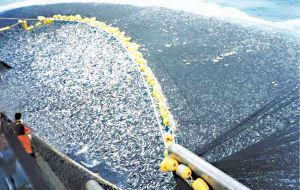MercoPress. South Atlantic News Agency
Greenpeace reacts to NOAA report showing U.S. overfished stocks at all-time low
 The US tuna fleet must keep to the same standards as in US waters. Tuna fisheries kill millions of sharks annually as bycatch, and some tuna populations remain in dire shape.
The US tuna fleet must keep to the same standards as in US waters. Tuna fisheries kill millions of sharks annually as bycatch, and some tuna populations remain in dire shape.  “We need to get serious about improving traceability, so there aren’t questions about where our seafood comes from or how it is caught”, said John Hocevar
“We need to get serious about improving traceability, so there aren’t questions about where our seafood comes from or how it is caught”, said John Hocevar The National Oceanic and Atmospheric Administration (NOAA) released the 2014 Status of U.S. Fisheries report, which indicates that the number of US fish stocks listed as overfished or subject to overfishing has dropped to an all-time low since 1997, when NOAA began tracking stock status.
However Greenpeace Oceans points out that too little attention has been paid to protecting the habitat that sustains fish and other types of marine life, and too much industrial fishing relies on methods that are overly destructive, as well as bycatch remains a serious problem for many fisheries, sometimes with major implications for whales, sea turtles, and other protected species.
“The progress that has been made toward eliminating overfishing in U.S. waters is encouraging and a testament to the effectiveness of our federal fisheries policy, the Magnuson-Stevens Act. However, we still have a long way to go before we can rest on our laurels. Too little attention has been paid to protecting the habitat that sustains fish and other types of marine life, and too much industrial fishing relies on methods that are overly destructive. Bycatch remains a serious problem for many fisheries, sometimes with major implications for whales, sea turtles, and other protected species”, said John Hocevar Director of Greenpeace Oceans Campaign.
“As we are seeing with the collapse of the sardine population off the California coast, intentionally reducing fish populations by 60% or more can make them much more vulnerable to the impacts of climate change. We need to factor in the uncertainty associated with climate change, and use a more precautionary approach to setting catch levels and managing for healthy ecosystems.
“We also need to be more consistent in holding U.S. fisheries that operate elsewhere, including most of our tuna fleet, to the same standards we hold vessels to in our own waters. Tuna fisheries kill millions of sharks each year as bycatch, and some tuna populations remain in dire shape.
“The U.S. is one of the world's most important seafood markets, but fraud and mislabeling are so common that it is difficult for seafood buyers to know what they are purchasing. We need to get serious about improving traceability, so there aren’t questions about where our seafood comes from or how it is caught.
“Unfortunately, many American seafood businesses still benefit from slavery on fishing vessels. While it may be unintentional, supermarkets and restaurants can no longer plead ignorance. The solutions are clear, but our seafood companies and policy makers have to take action. Slavery and other human rights abuses have no place in the supply chains of American businesses.”
To view the entire NOAA report, click here: http://www.noaanews.noaa.gov/stories2015/20150415-us-fisheries-continue-to-rebuild-overfishing-and-overfished-numbers-at-all-time-lows.html




Top Comments
Disclaimer & comment rules-

-

-

Read all comments“We need to factor in the uncertainty associated with climate change”
Apr 17th, 2015 - 07:26 am 0Uncertainty? Didn't think there was any, they have been telling us for decades that the science is settled.
http://en.mercopress.com/2015/04/16/greenpeace-reacts-to-noaa-report-showing-u.s.-overfished-stocks-at-all-time-low#comment393004: The science is “settled”. What's your point?
Apr 18th, 2015 - 03:00 am 0I wouldn't call it science until their models work. The Earth isn't getting warmer and hasn't for the last decade. That's proven.
Apr 19th, 2015 - 01:50 pm 0Just like I've been saying for a very long time.
These “scientists” are nothing more than liberal hacks.
Commenting for this story is now closed.
If you have a Facebook account, become a fan and comment on our Facebook Page!